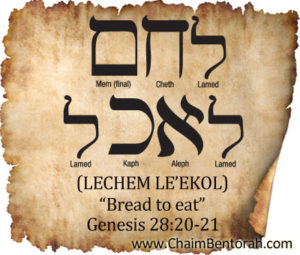HEBREW WORD STUDY – BREAD TO EAT – LECHEM LE’EKOL – לחם לאכל Lamed Cheth Mem Lamed Aleph Kap Lamed
Genesis 28:20-21: “And Jacob vowed a vowed and saying, If God will be with me and will keep in this way that I go and will give me bread to eat and raiment to put on, so then I come to my father’s house in peace, then shall the Lord be my God.”
 This verse is full of redundancies. He vows a vow. What else would you vow? Then he wants bread to eat. What else would you do with bread? Raiment to put on, what else do you do with clothes but wear them? This is a hint suggesting that he is also speaking of something much deeper. I read in the Rabbah that Jacob was not only presenting to God his physical needs, but his spiritual needs as well..
This verse is full of redundancies. He vows a vow. What else would you vow? Then he wants bread to eat. What else would you do with bread? Raiment to put on, what else do you do with clothes but wear them? This is a hint suggesting that he is also speaking of something much deeper. I read in the Rabbah that Jacob was not only presenting to God his physical needs, but his spiritual needs as well..
Lechem le’ekol is translated “Bread to eat.” That is the most obvious translation and makes the most sense. However, both lechem and le’ekol mean to consume food. Two different words meaning pretty much the same thing. However le’ekol could also be a picture of one’s heart being consumed by God. Beged lelebosh both mean garments or coverings. Lelebosh is also used for the covering from evil or treachery.
We call all this a play on words. Jacob was asking God to supply his physical need for food but at the same time to supply his spiritual need with His presence. At the same time he asked for clothes he was asking that God cover the evil in his heart or possibly the evil intent others may have toward him.
It seems the idea that the sages have tried to convey is that when we pray for our physical needs and well being, we must never lose sight of our spiritual needs as well. How many times we pray “Oh Lord, I need a job, I need to pay this bill, etc.” If we view this play on words in Genesis 28:20-21 as a hint as to how we should pray, then we would be praying: “Lord I need a job that will give me greater opportunity to grow in you.”
Stop and think about it. Suppose you need a job. Do you really need God to help you find a job. Millions of people find jobs without seeking God’s assistance. So if you go to God asking for a job isn’t that sort of like making God to be a little like a booster engine? Is that all He is, someone to give you little advantage over someone else? Did Jacob need God for food and clothing? He was fairly rich as this point, he could have done quite well in the food and clothing department without God. But what he was saying is: “I am going to trust you for my food and clothing not the arm of the flesh. I can do quite well on my own gathering food and clothing, thank you, but I am moving my dependence from my resources and placing them totally into your Hands. When that happens and I come to my father’s house in peace, (the conflict between my brother and I gets resolved), then you will truly be my God.”
We pray for a job, not that we need God to give us an advantage over someone else, but that we say we are depending upon Him for our daily bread so that He will be our God. Do we need God for our daily bread? Not really, God has given us enough resources to secure our daily bread without Him. However, if we want Him to be our God, we will go to him for our daily bread.
When you pray the Lord’s prayer and say: “Give us this day our daily bread.” Are you really aware of what you are asking for? Why did Jesus instruct us to pray that way. I mean people seem to get pretty well fed without that prayer. And if you have not prayed that prayer for some time, I daresay you have not gone hungry. It is more than asking God to meet our physical need, we are asking Him to meet our spiritual needs as well. When we say “Give us this day our daily bread” we are saying I am looking to you to supply my basic need so the Lord can truly be “my God.”







Thank you Chaim. Nice to hear we can and ought to pray for our spiritual needs. This is a real eye opener to me and makes me want to walk closer to and with God.
Jesus is The Bread of Life. I need Him daily.